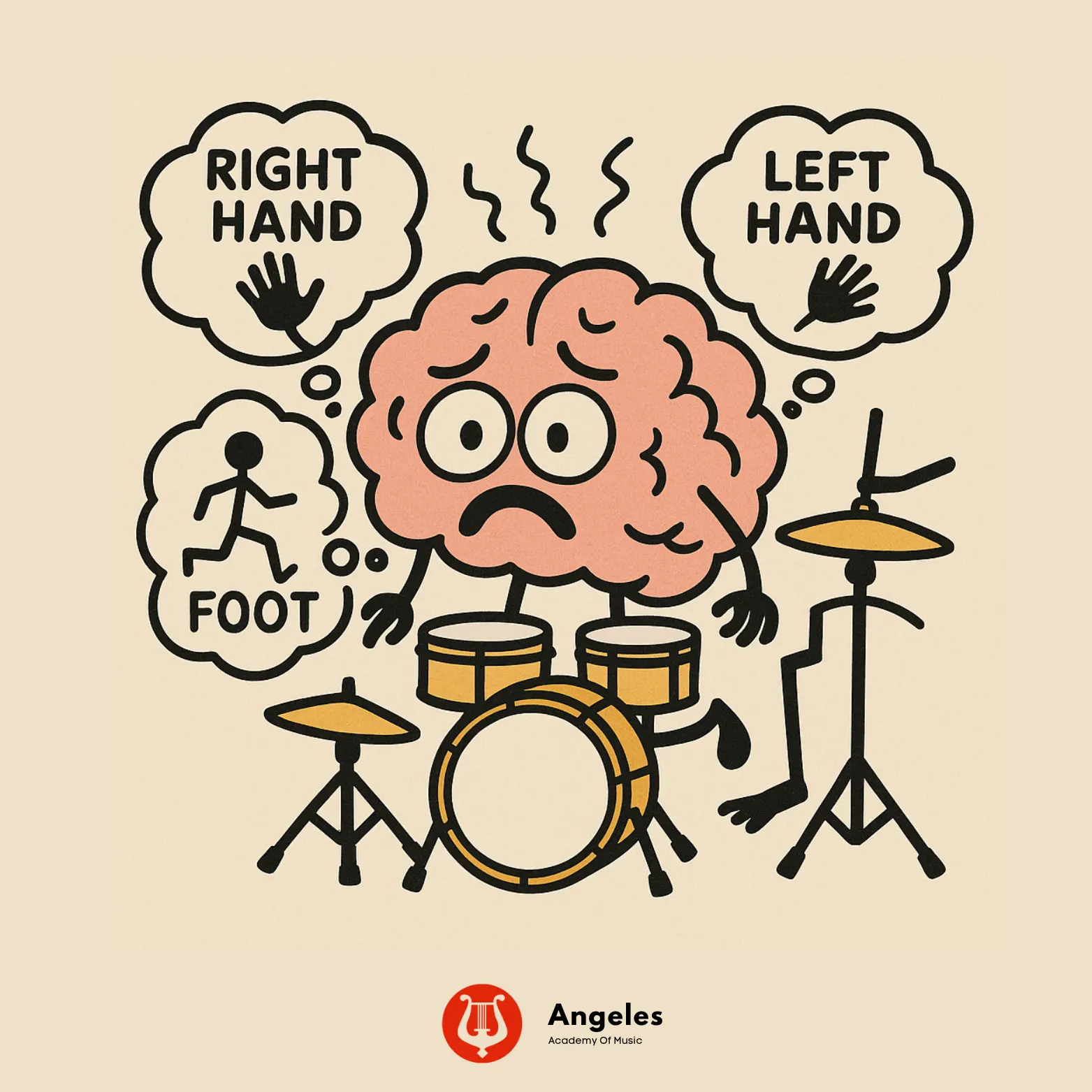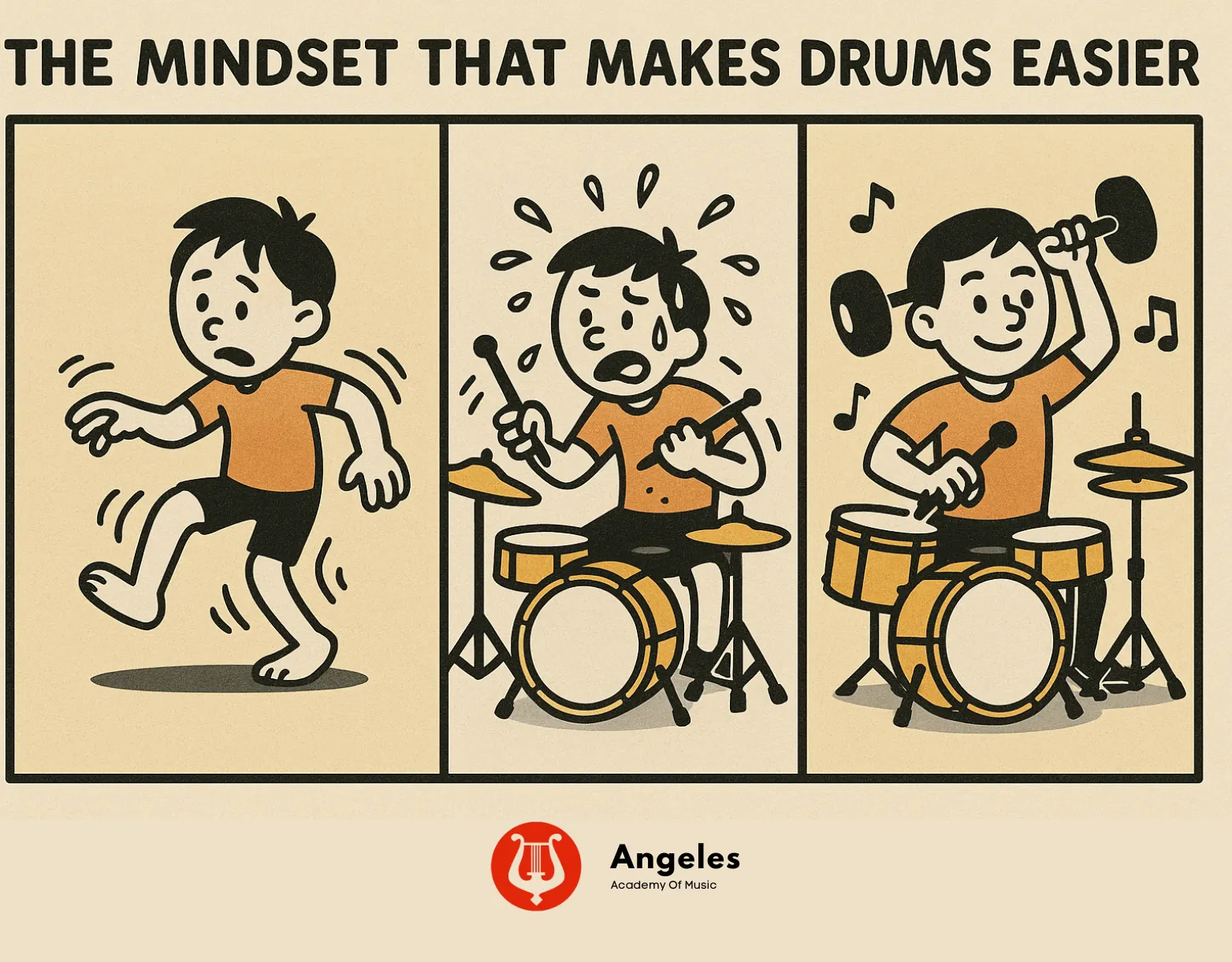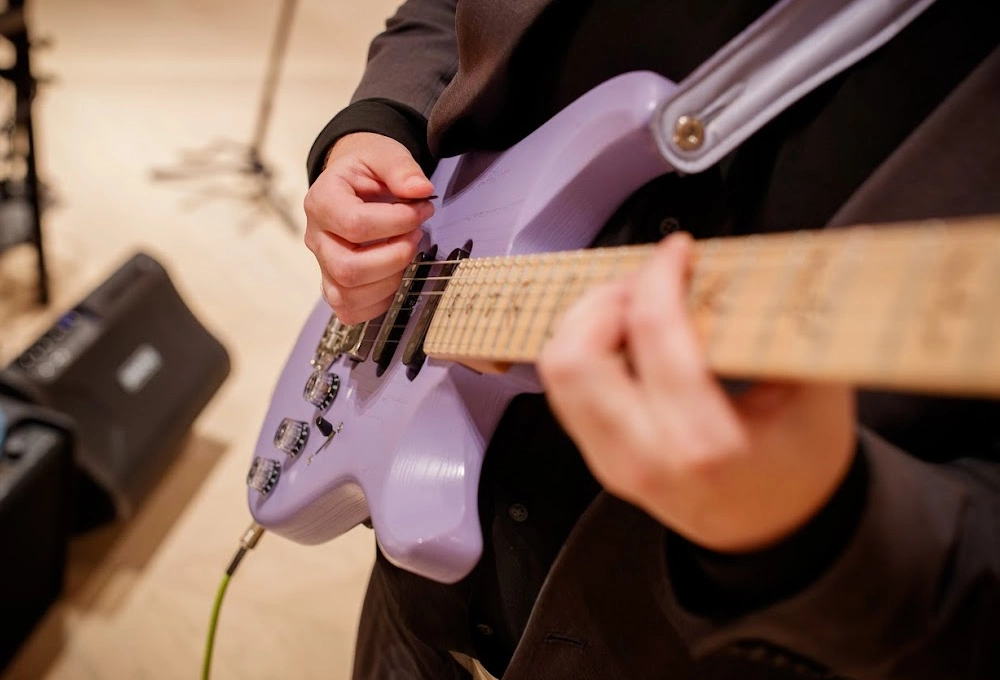If you’re new to the world of drumming, you’ve probably Googled this exact phrase at least once: are drums hard to learn? Closely followed by: how long does it take to learn drums?
Let’s not sugarcoat it. Yes, drums can feel hard at first. You’re asking your brain to make your right hand do one thing, your left hand another, while your right foot pounds the bass pedal and your left keeps the hi-hat pulsing in time. It feels less like music and more like a juggling act designed by a sadistic yoga instructor.
But here’s the truth: “hard” is a misleading word. Drums aren’t impossible. They’re layered. They’re more like an onion than a wall. Peel away one rhythm, one coordination pattern, one song, and suddenly you realize the structure beneath is simple, even logical.
The challenge is not that drums are too hard. It’s what most beginners expect to be great in a couple of days to two weeks, and then get crushed when their limbs rebel.
So, let’s reframe. Drumming is not hard. It’s awkward at first. And awkward is survivable, especially if you practice smart and, ideally, don’t go it alone.
Why Do People Think the Drums Are Hard to Learn?
In my 20+ years teaching at universities, music schools, and private studios in Los Angeles, I’ve seen the same sticking points appear over and over.
Parents ask me, “Are the drums hard to learn?” Students ask, “Am I too uncoordinated?” Adults sheepishly say, “I have no rhythm.” And I tell them all the same thing:
Drums are only as hard as the lies you tell yourself about them.
Here’s what really trips people up:
1. Coordination feels alien.
Your hands and feet have spent your whole life moving in sync: typing, walking, opening jars. Drums break that unity. The right hand might ride eighth notes while the left sneaks in ghost notes, the foot punches out syncopation, and your poor brain is screaming, “Pick a lane!”

The good news? The brain rewires fast. Within weeks, independence starts to feel normal.
2. Timing is brutally honest.
If your strumming hand lags a bit on guitar, most people won’t notice. If your stick is late by a fraction on the snare? Everyone feels it.
Drums are the spine of music. You can’t fake pulse. But, and here’s the relief, you also improve pulse faster than almost any other musical skill, because you’re forced to.
3. Technique is often ignored.
Most beginners grip sticks like hammers and wonder why their wrists ache after ten minutes. The right grip isn’t mystical. It’s loose, bouncy, and economical.
Once you feel that rebound, suddenly you’re working with the sticks, not against them. The problem isn’t that drums are hard. It’s that bad habits are exhausting.
4. Attention span > hero workouts.
Kids, teens, and adults alike think two hours on Sunday makes up for zero practice the rest of the week. Spoiler: it doesn’t. Drums reward short, consistent bursts of focus: 15 minutes a day trumps weekend marathons.
For more tips on learning drums faster, from basic technique to smart practice habits, guide on ‘How To Play Drums’ walks you through it step by step.
The Mindset That Makes Drums Easier
You need to get comfortable with sucking. At least at the beginning. You’re not supposed to sound like John Bonham in week two. You’re supposed to sound like you’re learning how to walk again: clumsy, funny, sometimes frustrating. That’s the point.
Think of drumming like the gym. The barbell isn’t “hard.” It’s heavy. You get stronger by lifting it consistently. Same with the kit. The beats that feel impossible on Monday feel boring by Friday if you stick with them.
And here’s the kicker: that awkward, clumsy stage? It doesn’t mean you’re failing. It means you’re right on schedule.

Why Drum Lessons Matter (Beyond YouTube and DIY Practice)
Yes, YouTube is packed with tutorials. Yes, you can learn your first grooves on your own. But nothing replaces sitting across from a real teacher. Private lessons, whether you typed in drum lessons near me, looked up drum classes near me, or searched for a drum instructor near me, give you something the internet can’t: personal feedback.
A good teacher spots the habits you don’t even know you’re forming, gives you the exact drill you need when you’re stuck, and keeps you accountable. (Let’s be honest. Most of us practice more when we know someone will actually hear us.)
And if you’re in Los Angeles, Angeles Academy of Music offers the best drum classes near you. Great drum lessons in Los Angeles are like cheat codes for progress; you skip months of trial-and-error and head straight to playing with confidence.
That’s why at Angeles Academy of Music, we don’t just pair you with “a drummer.” We match you with the right instructor for your style, age, and goals. Whether you’re six, sixteen, or sixty, the right mentor is the single biggest shortcut through the awkward beginner phase.
How Long Does it Take to Learn Drums?
If you came here for a magic number, like “six weeks to greatness!” Sorry. The truth is less like a diet plan and more like training for a marathon: everyone’s pace is different, but the road is surprisingly predictable once you see it.
When students ask me how long does it take to learn the drums, I answer with another question: how much are you willing to practice, and how consistently? Because drumming progress isn’t just about hours logged, it’s about rhythm (pun intended).
Practicing fifteen minutes a day, five days a week, beats the pants off one exhausted two-hour cram session on Sunday.
That being said, here’s what the journey typically looks like for a committed beginner who practices regularly and maybe takes structured drum lessons near me or, in LA, drum lessons in Los Angeles.
The First Two Weeks: From Chaos to Your First Beat
This is the “why are my limbs betraying me” stage. You learn how to hold sticks, sit properly, and play your first basic rock beat (bass drum on one and three, snare on two and four, hi-hat ticking away like a metronome).
At first, it feels like rubbing your belly and patting your head while riding a unicycle. Then, suddenly, it clicks. And you can play along with a song at slow tempo.
Most students nail their first beat within 7–10 days. Some even in their first lesson. And that’s addictive, because for the first time you’re not just practicing “exercises,” you’re playing music.
Weeks 3–6: The Confidence Boost
Here, things accelerate. You add simple fills, vary the hi-hat, and suddenly you can handle three or four grooves. By the end of this stage, you’re probably playing two to three songs end-to-end (albeit with some shaky transitions).
Parents usually notice something big here: the kid who “wasn’t sure” now won’t stop drumming on the kitchen table. Adults notice it too, and commute steering wheels turn into snares. This stage is about confidence, not perfection.
Months 2–3: Real Progress
You start to feel “like a drummer.” Reading simple rhythms (quarter, eighth, sixteenth notes) makes sense. Your fills actually land back on one without derailing the song. And you can lock in with recordings at different tempos.
With guided practice, most students here can play four to six songs smoothly and are ready to jam with friends. It’s no longer about “can I play a beat?” It’s about “can I choose the right beat for the song?”
Months 4–6: Expansion
Here’s where you start exploring genres. Funk grooves with syncopation, light jazz patterns, shuffle feels. Fills sound cleaner. Playing along to faster or trickier songs is now possible. And your timing is stronger, less like “following the click” and more like being the click.
Los Angeles students often get their first chance to play in a school concert, jam night, or church service around this time. Nothing sharpens progress like the adrenaline of other humans actually listening.
The First Year: Comfort Zone
By 9–12 months, with steady lessons and practice, you’re no longer a “beginner.” You can handle a basic rock, pop, or funk setlist. You can jam with other musicians without derailing the whole room. You’ve probably annoyed neighbors enough to justify soundproofing or an electronic kit.
And, perhaps most importantly, you’ve built an identity. You don’t just “take drum lessons.” You’re a drummer.
Year 2 and Beyond: Depth, Style, and Expression
Now we’re talking nuance. Ghost notes, dynamic control, genre-specific feels, improvisation. Maybe recording in a studio or gigging around LA. Some students join bands, some dive into advanced lessons, some just keep playing for joy. But by year two, you’re no longer asking “how long does it take to learn the drums?” You’re asking, “what do I want to explore next?”

The Short Answer
So, how long does it take to learn drums?
- To play your first beat: a week.
- To play songs with confidence: a few months.
- To sound good in a band: a year.
- To master? A lifetime.
And that’s the beauty. Like all music, drums aren’t a finish line. They’re a language you grow fluent in.
Do You Need a Drum Kit to Start?
Here’s a question I hear constantly: Do I need a full drum set to begin lessons? The answer is no. You can start with sticks, a practice pad, and a good teacher. In fact, the first weeks of drumming focus on rhythm, sticking, and coordination. Things you can practice on a pad, a pillow, or even your thighs if you’re determined enough.
Eventually, yes, you’ll want a kit. But you don’t need to rush. Think of a beginner drum set like a first bike. You want something sturdy, not flashy. You don’t need a Tour de France carbon frame; you need training wheels and a seat that won’t collapse. Same with drums. A simple drum set for beginners, acoustic or electronic, gets the job done.
For a deeper breakdown of what actually matters (and what doesn’t), you can check out our beginner’s guide to choosing a drum set. It walks through the basics like drum sizes, kit types, budget ranges, and the common mistakes beginners make, so you don’t overbuy or get stuck with the wrong setup.
Acoustic vs Electronic (Especially in Los Angeles Apartments)
Let’s be honest. If you live in LA, your walls are paper-thin, your neighbors are actors learning monologues, and your landlord has no tolerance for cymbals at midnight. That’s why the acoustic vs electronic debate hits differently here.
Electronic kits win in apartments: plug in headphones, practice at 2 a.m., zero noise complaints. They’re compact, forgiving, and come with built-in metronomes and coaching modes. Downsides? Cymbal feel is different, and cheap pads can feel like drumming on a trampoline.
Acoustic kits? Nothing beats the real sound and feel. They breathe, they roar, they teach touch. But they’re loud. Like, call-the-cops loud. In Los Angeles, if you go acoustic, be prepared with soundproofing or a garage.
So what’s the answer? If you’re serious, your long-term journey should include both. There are plenty of electronic drumming set for beginners that you can start with, if noise is a problem. Graduate to acoustic when you can. Many pros keep both.
You can read more on this (like kit recommendations, price, which kit to buy, etc.) here.
Drum Lessons vs Self Learning
Plenty of students search “can I teach myself drums?” The truth: you can. Plenty of drummers are self-taught. But here’s what many drummers secretly think: “I want to get better faster, and I don’t want to waste time guessing.”
Lessons add three crucial things: accountability, correction, and encouragement.
They know a teacher keeps their child focused and inspired. And adults know that having a drum instructor near me stops them from hitting ceilings they didn’t know were there.
In Los Angeles, you’re spoiled for choice. At Angeles Academy of Music, every teacher is background-checked, university-trained, and chosen from thousands of applicants.
That’s why our drum lessons in Los Angeles stand out. You’re not just hiring a drummer; you’re working with an educator who knows how to connect.
FAQs (Straight Talk)
Are the drums hard to learn?
At first, yes. They feel awkward. But awkward is temporary. Within weeks, your brain adapts, and you’re making music.
How long does it take to learn the drums?
To play your first beat: one week. To play songs: two to three months. To sound good in a band: about a year. Mastery? That’s a lifetime gig, but a joyful one.
Do I need my own drum set to start?
No. A practice pad and sticks are enough for the first few weeks. Lessons can begin without a full kit.
Am I too old to start?
Never. I’ve taught kids at 7, parents at 40, and retirees at 70. If you can tap your foot, you can learn drums.
How much do lessons cost in Los Angeles?
It varies, but expect $40–$60 per session. Packages and school rates may differ. (Check our tuition page for current details.)
The Final Beat
So, let’s circle back. Are drums hard to learn? Not really. They’re awkward at first, but awkward becomes fun shockingly fast. And how long does it take to learn drums? Long enough to teach you patience, short enough to surprise you.
Within weeks, you’ll play your first song. Within months, you’ll feel like a musician. Within a year, you’ll own the room when you sit at the kit.
And here’s the last truth: drums are not just about music. They’re about identity. Each beat you learn is a reminder that you can coordinate chaos, that discipline makes joy, that rhythm is already inside you. You’re just unlocking it.
If you’re ready to start that journey, our private drum lessons Los Angeles are designed for kids, teens, and adults at every level. Register now here.
Contributed by: Jonathan B., Senior Percussion Instructor at Angeles Academy of Music (Bachelors of Music, Musicians Institute; Associate of Arts, Suffolk College.)
.svg)
.svg)
.svg)
.svg)
.svg)
.svg)





.svg)